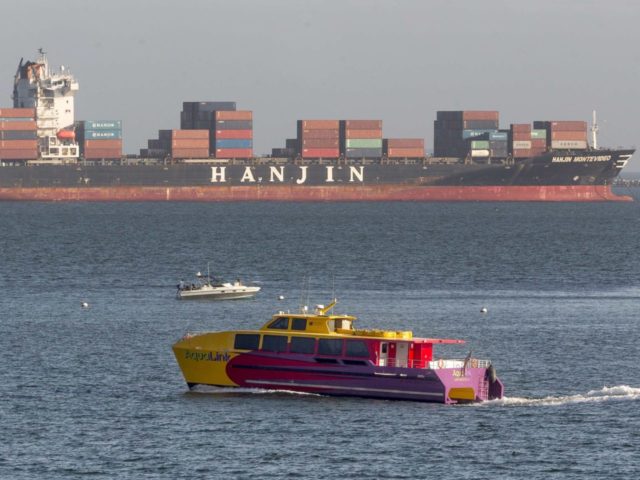With “globalism” under political attack, South Korea’s Hanjin Shipping Co., one of the world’s largest shipping companies, filed for bankruptcy and stranded $14 billion of holiday stock on the open ocean after container rates tanked by 96 percent.
Hanjin controls about 3.2 percent of all worldwide shipping traffic. It filed for bankruptcy protection on August 30, after banks pulled their funding to pay dock fees and container unloading and storage charges. Of Hanjin’s fleet of 200 vessels, 97 ships loaded with about 500,000 containers are stranded at sea.
As the American public’s rebellion against globalism and multi-national corporations’ crony capitalism has dominated this year’s U.S. presidential election, the Baltic Freight Rate Index (BDIY:IND), which tracks container shipment demand, has collapsed by 96 percent from its high of almost $12,000 per container in 2008 to an epic low of $290 in early February 2016.
Despite the Hanjin bankruptcy turmoil stranding its fleet and creating a logistics nightmare, the Index has only risen from $711 to $773 per container.
Global container shipping capacity began accelerating during the Clinton administration’s opening up of trade with China. From a base of 20 million deadweight tons in the early 1990s, capacity grew by over 1,100 percent to 228 million deadweight tons at the end of 2015.
Although container shipping demand has been flat for the last three years, ship capacity continued to grow and still is expected to expand by 7.7 percent in 2016, as China desperately continues building enormous new ships to maintain employment and consume some of its massive excess steel-making capacity.
The timing of Hanjin’s bankruptcy filing presents significant risks for U.S. retailers stocking up for the fall, Thanksgiving and Christmas shopping seasons.
Samsung Electronics Co., which introduced its Galaxy 7 smartphone in March, told the Wall Street Journal that it has $38 million in various device inventory stranded on Hanjin ships in international waters. The company’s lawyer, Evan Jones, commented, “We’re passengers on a bus, and we’re being told we can’t get off,”
But the real show-stopper could be slowing deliveries of Apple Inc.’s new iPhone 7 and iPhone 7 Plus smartphones, which will begin taking pre-orders on September 9 and are expected to start shipping on September 16.
Most Wall Street analysts have panned the new Apple products as not “disruptive.” But the Apple’s iPhone 7 Plus was expected to earn better sales traction initially, after the hot-selling Samsung Galaxy Note 7 was recalled due to a number of batteries exploding during charging.
Hanjin owes South Korean banks about $5 billion, and has negative cash flow. It is assumed that eventually the South Korean government will facilitate a merger with Hyundai Merchant Marine Co Ltd., the country’s second-largest shipping line.
But such a consolidation would require huge layoffs and scrapping billions of dollars worth of assets, according to South Korea’s Financial Services Commission. It would also require paying damages for breaking contracts and stranding merchandise.
Under International Commercial Terms published by the International Chamber of Commerce, referred to as Incoterms, shipping customers generally receive a letter of credit against payment when their products leave the freight dock. Consequently, Asian manufacturers have probably already been paid by their banks.
But that means that U.S. and European retailers own the merchandise on board Hanjin ships. Huge international retailers like Walmart usually have insurance, and will be paid for their goods quickly, but mid-size and smaller companies could be delayed in legal negotiations for weeks or court battles with Hanjin creditors for months before they gain access to their inventory.
Nate Herman, senior vice president for the American Apparel & Footwear Association, which represents 150 of the top U.S. shoe manufacturers and retailers, told PYMNTS.com after an all-hands-on-deck industry conference call with 150 members: “People are still trying to figure out how to get their boxes off the boat and move them.”
Mr. Herman said his members believe “This is not impacting store shelves now.” But, he added, “It will impact store shelves if the situation isn’t resolved.”

COMMENTS
Please let us know if you're having issues with commenting.